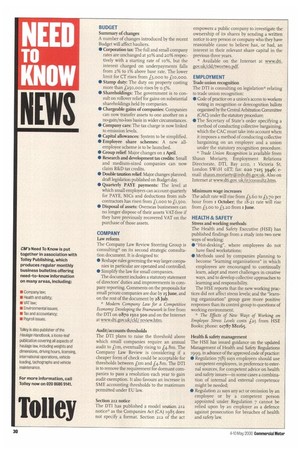T olley
Page 32

If you've noticed an error in this article please click here to report it so we can fix it.
BUDGET Summary of changes A number of changes introduced by the recent Budget will affect hauliers.
• Corporation tax: The full and small company rates are unchanged at 30% and zo% respectively with a starting rate of io%, but the interest charged on underpayments falls from 2% to 1% above base rate. The lower limit for CT rises from 15,000 to fio,000.
• Stamp duty: The duty on property costing more than £250,000 rises by 0.5%.
• Shareholdings: The government is to consult on rollover relief for gains on substantial shareholdings held by companies.
• Chargeable gains of companies: Companies can now transfer assets to one another on a no-gain/no-loss basis in wider circumstances.
• Company cars: The tax charge is now linked to emission levels.
• Capital allowances: System to be simplified.
• Employee share schemes: A new allemployee scheme is to be launched.
• Group relief': Major changes on i April.
• Research and development tax credits: Small and medium-sized companies can now claim R&D tax credits.
• Double taxation relief Major changes planned; draft legislation published on Budget day.
• Quarterly PAYE payments: The level at which small employers can account quarterly for PAYE, NICs and deductions from subcontractors has risen from Li,000 to £1,500.
• Disposal of assets: Overseas businesses can no longer dispose of their assets VAT-free if they have previously recovered VAT on the purchase of those assets.
COMPANY Law reform The Company Law Review Steering Group is consulting* on its second strategic consultation document. It is designed to: • Reshape rules governing the way larger companies in particular are operated and controlled; • Simplify the law for small companies.
The document indudes a statutory statement of directors' duties and improvements in company reporting. Comments on the proposals for small private companies are due by 15 June, and on the rest of the document by 28 July.
* Modern Company Law for a Competitive Economy: Developing the Framework is free from the DTI on 0870 1502 500 and on the Internet at www.dti.gov.uk/c1d/ review.htm.
Audit/accounts thresholds
The DTI plans to raise the threshold above which small companies require an annual audit to Dm, eventually rising to £4.8m. The Company Law Review is considering if a cheaper form of check could be acceptable for thresholds between fim and £4.8m. The DTI is to remove the requirement for dormant companies to pass a resolution each year to gain audit exemption. It also favours an increase in SME accounting thresholds. to the maximum permitted under EU law.
Section 212 notice The DTI has published a model section 212 notice* as the Companies Act (CA) 1985 does not specify a format. Section 212 of the act empowers a public company to investigate the ownership of its shares by sending a written notice to any person or company who they have reasonable cause to believe has, or had, an interest in their relevant share capital in the previous three years.
* Available on the Internet at www.dti. gov.uk/dd/twortwo.pdf.
EMPLOYMENT Trade union recognition The DTI is consulting on legislation* relating to trade union recognition: • Code of practice on a union's access to workers voting in recognition or derecognition ballots organised by the Central Arbitration Committee (CAC) under the statutory procedure; • The Secretary of State's order specifying a method of conducting collective bargaining, which the CAC must take into account when it imposes a method of conducting collective bargaining on an employer and a union under the statutory recognition procedure.
* Trade Union Recognition is available from Shaun Moriarty, Employment Relations Directorate, DTI, Bay 2110, r Victoria St, London SWIFI oET; fax: 020 7215 3946; email: shaun.moriartyk. Also on Internet at www.dti.gov. uk/ir/consultz.htm.
Minimum wage increases
The adult rate will rise from £3.60 to £3.70 per hour from i October; the 18.21 rate will rise from £3.00 to £3.20 from i June.
HEALTH & SAFETY Stress and working methods The Health and Safety Executive (HSE) has published findings from a study into two new ways of working: • "Hot-desking", where employees do not have fixed workstations; • Methods used by companies planning to become learning organisations" in which employees are encouraged to continually learn, adapt and meet challenges in creative ways, and to develop collective approaches to learning and responsibility.
The HSE reports that the new working practices did not affect stress levels; and the "learning organisation" group gave more positive responses than its control group to questions of working environment.
* The Effects of New Ways of Working on Employee Stress Levels costs £25 from HSE Books; phone: 01787 881165.
Health & safety management
The HSE has issued guidance on the updated Management of Health and Safety Regulations 1999, in advance ofthe approved code of practice:
• Regulation 7(8) says employers should use competent employees, in preference to external sources, for competent advice on health and safety issues—in some cases a combination of internal and external competence might be needed; • Regulation 21 says any act or omission by an employee or by a competent person appointed under Regulation 7 cannot be relied upon by an employer as a defence against prosecution for breaches of health and safety law.




































































































